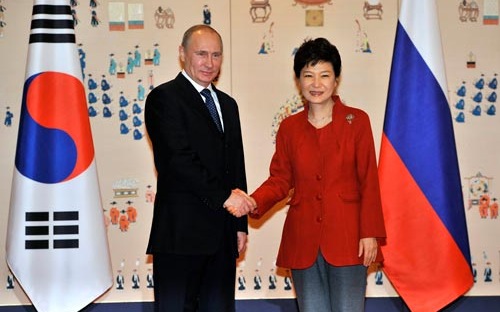RUSSIA, KOREA AND INTERESTING ON “SILK RAILWAY”

On November 13, Russian President Vladimir Putin and South Korean President Park Geun-hye witnessed the signing of a memorandum of understanding on cooperation in building a railway connecting Europe, Asia, and North Korea.
According to AFP news agency, this "silk railway" project (a simile from the ancient "silk road", a famous system of trade routes connecting Asia with Europe for thousands of years) is a major infrastructure policy priority of the Russian leader for many years.
When completed, this railway will open a seamless transport route from Europe to the southern coast of Korea, with the foundation of Russia's Trans-Siberian Railway (TSR).
In their statement, the two leaders of Russia and South Korea said that connecting this railway line will contribute to peace and prosperity on the Korean peninsula and in Northeast Asia, as well as promote Eurasian development cooperation.
"South Korea and Russia will jointly build the Eurasian era for the new future," Mrs.Park said.
According to Asia News Network, Ms. Park is promoting the "Eurasian Initiative", which calls for expanding links between countries on the two continents, through the connection of roads and railways to create a new Silk Road from Korea to Europe through Korea, Russia, and China.
Speaking at the closing ceremony of the 3rd Russia-Korea Dialogue Forum, Mrs. Park also said, "The leaders of the two countries are willing to share the aspiration to work together towards a new Eurasian era. Accordingly, South Korea will focus its policy on promoting Eurasian cooperation, while Russia will focus its policy on the Asia-Pacific."
Therefore, the above agreement between Russia and South Korea is the first step towards this ambitious vision. Currently, Russia got the first step of this project in September when it completed 54 km of the track from the eastern border of Khasan town (Russia) to Rajin port in northeastern North Korea.
With the participation of Seoul, the Silk Railway will be connected to the Busan port area in southern Korea, facilitating the transportation of goods between this country and Europe, as well as opening a new path for indirect investment in Pyongyang.
According to the memorandum of understanding, a group of South Korean companies, including Posco Steel Corporation,
Korea Railway Company and Hyundai Merchant Marine Co. will participate in the shares purchase of RasonKonTrans, a joint venture between Russia and North Korea that is carrying out a project to renovate railways and seaports.
According to some sources, it is likely that Russia will contribute 36% of the shares in this project, while South Korea has 34% and Pyongyang has 30%.
However, according to some analysts, if the ambitious plan is to proceed smoothly, it must solve major political obstacles, first and foremost is the turbulent inter-Korean relationship as well as North Korea's controversial nuclear program.
Andrei Lankov, a Russian expert on North Korean affairs who teaches at Kookmin University in Seoul, said he remains "very skeptical" of the project's success because of the not-so-good relationship between North Korea and South Korea, as well as the reaction of the international community to North Korea's nuclear ambitions.
"The idea seems perfect from an economic and commercial perspective. But the project will cost billions of dollars and companies will risk that big investment with North Korea in the current situation." Mr. Lankov said.
Not to mention that there is not enough trust between the two Koreas for South Korea to connect such important infrastructure with the North. According to Lankov, North Korea will be very welcome because, in addition to economic benefits, it will have more "hostages" in relations with other parties.
Observers have linked the railway project to the Kaesong inter-Korean industrial park, in which North and South Korea jointly operate. In April, Pyongyang unilaterally closed the industrial park amid escalating military tensions. This has caused many difficulties for businesses and workers working in Kaesong.
Speaking at a Korea-Russia business conference, President Putin also acknowledged the existence of such difficulties but said that the potential advantages of this project outweighed.
"I hope that the political problems will be resolved soon because both South Korea, North Korea, and Russia will have great economic interests when this project is completed," Putin said. According to him, "this project, once completed, will make a great contribution to the establishment of peace and stability on the Korean peninsula".
-159x76-159x76.png)
